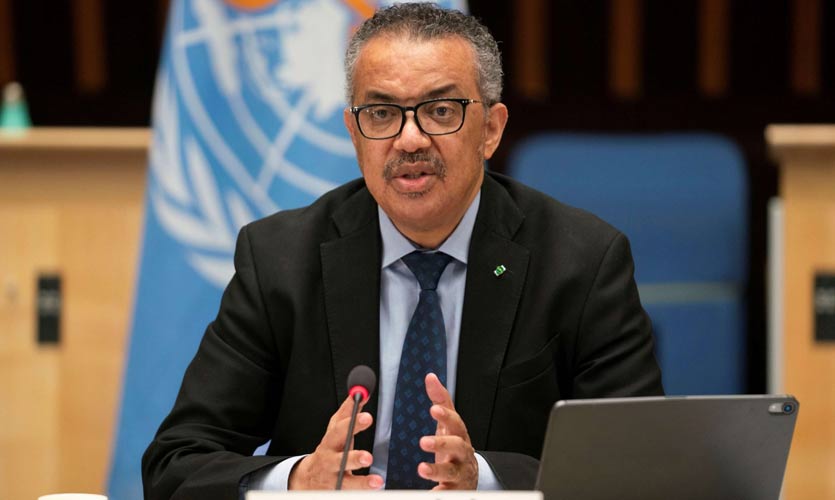Director General of the World Health Organization (WHO), Dr Tedros Adhanom Ghebreyesus has warned that more variants of the novel coronavirus can emerge, and that it is highly risky to assume that the Omicron variant is the last one or that “we are in the endgame”. The WHO chief exhorted all countries to put their collective efforts into bringing the acute phase of the pandemic to an end. He noted that it could pass over by the end of 2022 if some targets are met and countries have the tools available to do so.
Dr Tedros stated that “ending the acute phase of the pandemic must remain our collective priority”. He further said, “There are different scenarios for how the pandemic could play out and how the acute phase could end. But it is dangerous to assume that Omicron will be the last variant or that we are in the endgame. On the contrary, globally, the conditions are ideal for more variants to emerge.”
“We simply cannot end the emergency phase of the pandemic unless we bridge this gap. On average last week, 100 cases were reported every three seconds, and somebody lost their life to COVID-19 every 12 seconds,” he added.
Dr Tedros said that to end the pandemic as a global health emergency, countries should collectively meet some goals such as the WHO’s target to vaccinate 70 percent of each country’s population by the middle of 2022, with enhanced focus on those who are at a high risk of getting affected and improving testing and sequencing rates to track the virus and its emerging variants more closely.
“It’s true that we will be living with COVID for the foreseeable future and that we will need to learn to manage it through a sustained and integrated system for acute respiratory diseases to help prepare for future pandemics,” he said, adding, “But learning to live with COVID cannot mean that we give this virus a free ride. It cannot mean that we accept almost 50,000 deaths a week from a preventable and treatable disease.”
Urging countries to strengthen the WHO and increase funding for it to deal with major health crisis like the COVID pandemic, Tedros said, “Let me put it plainly: If the current funding model continues, WHO is being set up to fail.” He continued, “The paradigm shift in world health that is needed now must be matched by a paradigm shift in funding the world’s health organization.”
Though the Omicron variant is less likely to cause severe health disorder, studies suggest that the variant spreads more easily than other coronavirus strains and is more likely to infect even those who have been vaccinated or been previously infected by prior versions of the virus. “We will need to learn to manage it through a sustained and integrated strategy for acute respiratory diseases,” said Tedros.
Read more: Omicron Surge: WHO Warns Of ‘Storm’ Threatening Healthcare Systems In Europe
In a separate statement, WHO’s European region head Dr Hans Kluge mentioned that the Omicron variant “offers plausible hope for stabilisation and normalisation”. However, cautioning that “our work is not done”, Dr Kluge cited signs that Omicron has shown to cause severe diseases while being more transmissible. Reiterating that there has been “huge disparities” in the accessibility of the vaccines, Dr Kluge warned that the less immunised areas could allow the virus to spread more and even lead to new variants. “It is almost a given that new COVID-19 variants will emerge and return,” he added.
Dr Kluge said that countries should strictly follow certain norms like strong surveillance of new variants, high vaccination uptake, regular ventilation of indoor areas, affordable equitable access to antiviral drugs, targeted testing, mask-wearing and physical distancing. “If and when a new variant appears, I believe that a new wave could no longer require the return to pandemic-era population-wide lockdowns or similar measures,” he said.
Having emerged in late 2019, the deadly COVID-19 has claimed the lives of over 5.5 million people across the globe and the number of cases of affected individuals have been driven to record levels since Omicron emerged. The new variant was first detected in southern Africa a few weeks back and according to Dr Tedros, around 80 million cases have been reported to WHO since it emerged – more than the total number of cases in 2020.










